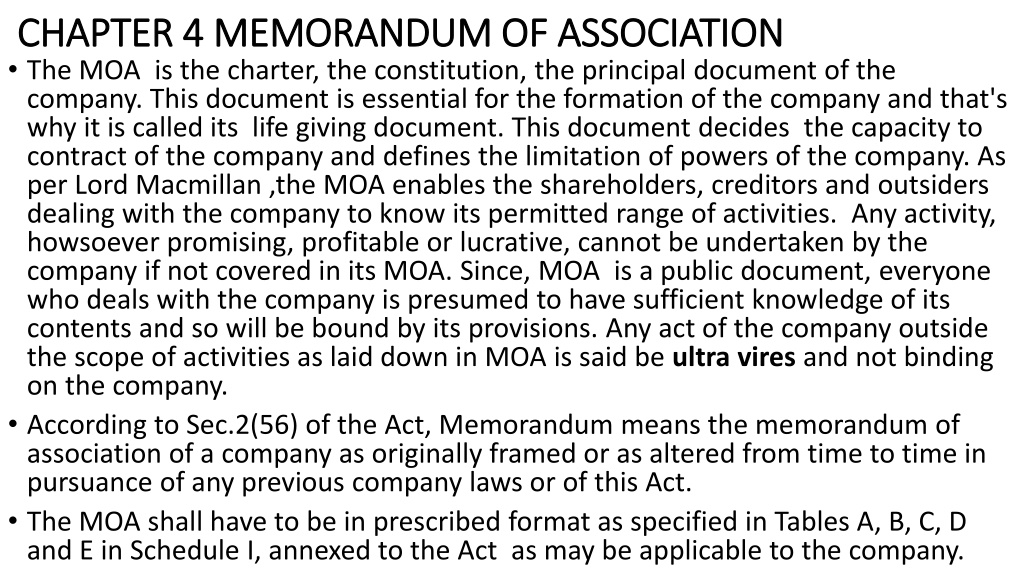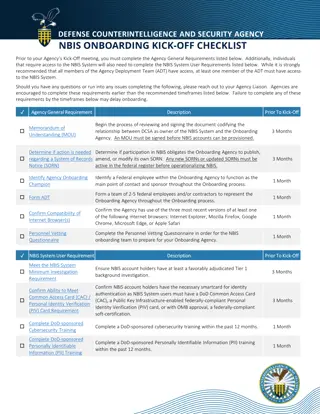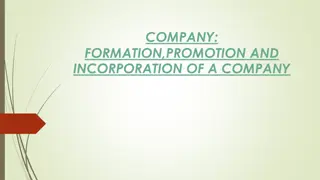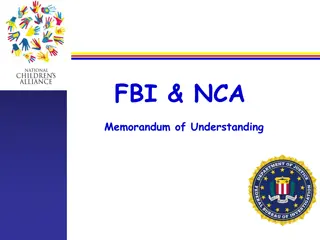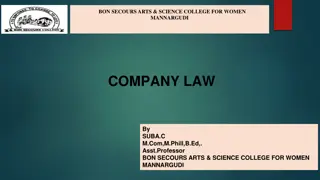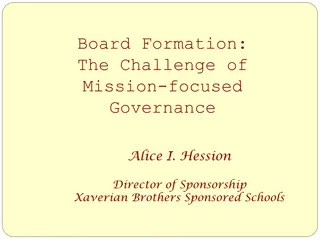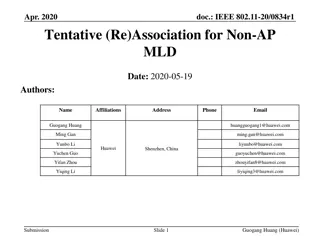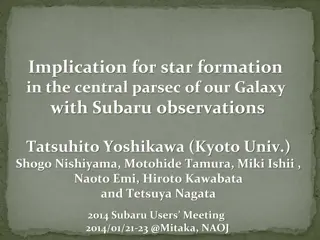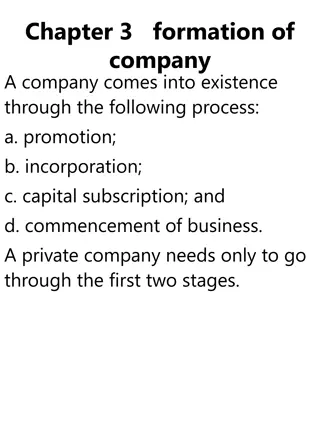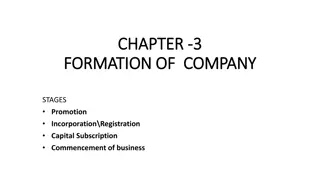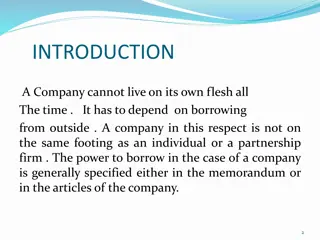Understanding the Memorandum of Association (MOA) in Company Formation
The Memorandum of Association (MOA) is a crucial document that serves as the constitution of a company, determining its powers and limitations. It outlines essential clauses such as the registered office, objects, liability, capital, subscription, and the name clause. Compliance with the MOA is mandatory for all activities undertaken by the company, and any act outside its scope is considered ultra vires. This document is public, binding all who engage with the company. Proper naming conventions, including the use of 'Limited' or 'Private Limited,' are outlined, with requirements for displaying the company name on official publications and communications.
Download Presentation

Please find below an Image/Link to download the presentation.
The content on the website is provided AS IS for your information and personal use only. It may not be sold, licensed, or shared on other websites without obtaining consent from the author. Download presentation by click this link. If you encounter any issues during the download, it is possible that the publisher has removed the file from their server.
E N D
Presentation Transcript
CHAPTER 4 MEMORANDUM OF ASSOCIATION CHAPTER 4 MEMORANDUM OF ASSOCIATION The MOA is the charter, the constitution, the principal document of the company. This document is essential for the formation of the company and that's why it is called its life giving document. This document decides the capacity to contract of the company and defines the limitation of powers of the company. As per Lord Macmillan ,the MOA enables the shareholders, creditors and outsiders dealing with the company to know its permitted range of activities. Any activity, howsoever promising, profitable or lucrative, cannot be undertaken by the company if not covered in its MOA. Since, MOA is a public document, everyone who deals with the company is presumed to have sufficient knowledge of its contents and so will be bound by its provisions. Any act of the company outside the scope of activities as laid down in MOA is said be ultra vires and not binding on the company. According to Sec.2(56) of the Act, Memorandum means the memorandum of association of a company as originally framed or as altered from time to time in pursuance of any previous company laws or of this Act. The MOA shall have to be in prescribed format as specified in Tables A, B, C, D and E in Schedule I, annexed to the Act as may be applicable to the company.
Contents of the MOA(Sec.4) Contents of the MOA(Sec.4) Registered office clause Objects clause Liability clause Capital clause Subscription clause Name clause NAME CLAUSE Name must end with words 'Limited' or 'Private Limited' in case of public and private cos. respectively. However, Charitable Companies u\s 8 are exempted from using these 'limited' or 'Private Limited' words with their names.In case of one person company, the words(OPC) shall be mentioned in brackets below the name of the company wherever it is printed. Further, in case of One person Company, the name of nominee must be stated in the MOA Name chosen must not be identical\ similar to the name of another existing company. Case- Ewing v Buttercup Margarine Company Ltd.Ewing was carrying on the business as Buttercup Dairy Company. A new company named Buttercup Margarine Company Ltd. was incorporated. The plaintiff filed a suit against the company for restraining it from carrying business under the aforesaid name on the ground that the name of newly incorporated company was similar to Buttercup Dairy Company .The court upheld the contention of plaintiff and restrained the new company from using the said name. Name should not be misleading i.e.name should not unnecessarily connote govt. participation or patronage eg. words such as Central, Union, National, etc.should not be used used unless circumstances justify. Name should not be offensive or undesirable in the opinion of the Central Govt i.e.the name adopted must not violate the provisions of the Emblems and Name (Prevention of Improper use)Act 1950. Publication of name by company- once the name is chosen and company gets registered in that name, it must appear (in one of the local language) outside everything office \ place of business in a conspicuous manner. The company shall get its name printed on all its official publications, business letters, bill heads, letter heads, notices etc., along with registered office address, CIN, telephone, fax. no., email, website address.Where a company has changed its name during the last two years, it shall also print its former name along with the present name.
REGISTERED OFFICE CLAUSE REGISTERED OFFICE CLAUSE This clause mentions the STATE in which the company's registered office is to be situated . This is required to fix the domicile of the company. The actual address of the registered office is not to be stated in MOA. However, the company is required to have specified premises in that state as its registered office and must file with ROC, the verification of its registered office within 30 days of incorporation. Whenever there is any change in the address of registered office, a notice of such change must be given to the Registrar for record within 30 days of change. All the communications and notices to the company are to be sent at the registered office address. Further, register of members, register of debenture holders, register of charges, minutes books of general meetings etc . are all kept at the registered office.
OBJECTS CLAUSE OBJECTS CLAUSE This is the most important clause of MOA because it decides the contractual capacity or vires of the company. A company can only undertake those activities that are covered under the scope of object clause. Activities that are outside the scope of objects clause ,howsoever remunerative, promising or profitable they may appear to be, will be considered ultravires. The purpose of objects clause is to protect the interest of shareholders of the company as well as public. The shareholders know that now their money cannot be misused or diverted elsewhere and will used only for activities \projects covered in objects clause and the public gets to know the extent of company's powers and whether the particular transaction they are entering with company is valid or ultra vires. While drafting the objects clause, the following facts should be kept in mind. objects must not be illegal, e.g. to carry business of prostitution, or lottery or smuggled goods etc. objects must not b against the provisions of the Companies act, e.g. to issue shares at discount ( it contravenes sec 53) ,to declare dividend out of capital( it is prohibited u\s 123) must not be against public policy, eg , to carry on trade with alien enemy must not be vague ,ambiguous or indeterminable, e.g. to take up any work which it deems profitable The object clause shall be divided into Main Objects to be pursued by the company on incorporation ,e.g. to do mining of coal Ancillary Objects are those which help in achieving main objects i.e. ancillary \conducive\supplementary to attainment of main objects e.g. to buy freehold land surface to dig mines In addition to powers expressly provided in objects clause, a company has certain implied powers (which are not written in objects clause but are assumed to be exercisable by a company) such as - to borrow money, to engage employees or agents, to compromise disputes, to mortgage\ sell \rent\lease land etc.
LIABILITY CLAUSE LIABILITY CLAUSE This clause states that the extent of liability of members of the company. The liability of members shall be as follows in case of a company limited by shares, the liability of members shall be limited to the amount unpaid on their shares, in case of a company limited by guarantee, the liability of members shall be limited to the amount each member has undertaken to contribute to the assets of the company in the event of its winding up in case of unlimited company, the liability of members shall be unlimited
CAPITAL CLAUSE CAPITAL CLAUSE This clause states the share capital with which the company is proposed to be registered . This capital is called authorised, registered or nominal capital. . There is no legal limit on authorised capital. So the authorised capital must be sufficiently high so that issue of shares can be easily done to finance future projects.The stamp duty is payable on this amount. The clause further states their denomination and their number in total. Equity shares can have denomination of 10 or 100 and preference shares can only be in denomination of 100.However, companies which have dematerialized their shares have freedom to issue equity shares in any denomination which should not be less than 1. This clause also states the number of shares which the subscribers to the MOA have agreed to purchase. ASSOCIATION OR SUBSCRIPTION CLAUSE This clause contains the "declaration of association" made by signatories of MOA that they desire to be formed into a company and that they agree to purchase shares indicated against their names. Their signatures are duty attested by witnesses. Each subscriber must take at least one share. However, this provision is not applicable to companies which are limited by guarantee or having unlimited liability, and which has no share capital. There must be at least 7 signatories in case of public co., at least 2 in case of private company and only 1 in case of One Person Company. The subscribers usually act as the first directors of the company.
ALTERATION OF THE MEMORANDUM ALTERATION OF THE MEMORANDUM The provisions of the memorandum can be altered by a special resolution(SR) and as per the procedures specified in the Companies Act . The alteration becomes effective only from the date of registration by the ROC. Where an alteration is made in MOA, every copy of MOA issued subsequently must be in accordance with alteration otherwise the company and every officer in default shall be fined @ 1000 per copy issued without alteration.
ALTERATION OF NAME CLAUSE ALTERATION OF NAME CLAUSE Passing of SR+ written approval of CG - whenever any company wants to change its name Passing of SR only( no need of CG approval) - when change in name involves only addition \ deletion of word "private"due to conversion of a public co. into private or vice versa. Passing of OR within 3 months of CG direction - when through inadvertance or otherwise a company's name gets wrongly registered ,which in the opinion of CG ,is identical with some existing companies name or is undesirable and so CG directs the company to change its name. Passing of OR within 6 months of CG direction- when a petition is received by CG ( within three years of incorporation or change of name of the company ) from a registered proprietor of a trade mark that the company's name is identical or similar to his registered trademark\name and so CG directs the company to change its name. The company shall submit the following documents with ROC within prescribed time Notice of change of name Copy of SR Copy of CG's approval order\ Copy of CG's direction order The ROC will do the following enter new name on the " Register of Companies" enter new name in the MOA of company issue a fresh Certificate of Incorporation in Form no. INC 25 bearing the new name
ALTERATION OF REGISTERED OFFICE CLAUSE ALTERATION OF REGISTERED OFFICE CLAUSE Passing of SR - when company changes registered office from one city to another within the same State Passing of SR + Confirmation from Regional Director - when company changes registered office from one city to another within same State but from jurisdiction of one ROC to another ROC e.g. applicable only in two States- Tamilnadu and Maharashtra -both having two ROC (Chennai and Coimbatore) and (Mumbai and Pune) respectively Passing of SR + Sanction of CG - when company changes registered office from one State to another. CG gives approval only when it is satisfied that the company has given advertisement in a vernacular and an English newspaper about its shifting; has sent individual notices to creditors and debentureholders ; it has obtained their consent or fully satisfied \ duscharged dissenting creditors ; it has given affidavit not to retrench employees and has fulfilled other prescribed terms and conditions. Passing of BOD Resolution - when a company changes registered office within same city in the same State. The company shall submit the following documents with ROC Notice of new address to the concerned ROC within prescribed time Copy of SR (in all situations except when shift is intra city) Copy of Regional Directors Confirmation Order ( when shift involves cities under jurisdiction of two different ROCs within same state) Copy of Central Government Confirmation Order and copy of altered MOA- to be submitted to both the ROCs ( when shift involves two different States) The ROC will do the following make changes in his Register of Companies issue Certificate of Registration transfer all the records of the company to the new ROC ( when shift involves cities under jurisdiction of two different ROCs within same state or different States) issue fresh Certificate of Incorporation ( when shift involves two different States)
ALTERATION OF OBJECTS CLAUSE ALTERATION OF OBJECTS CLAUSE Passing of SR (either by means of postal ballot or in a general meeting with e voting facility) Passing of SR+ Publication of justification for alteration in newspapers and company's website+ Giving Exit Opportunity to dissenting shareholders- when a company has raised public money through prospectus and still has some unutilized amount in it for which it wants to change its objects The company shall submit to the following documents with ROC Copy of SR authorising alteration Copy of MOA as altered The ROC will do the following issue Certificate of Registration
ALTERATION OF LIABILITY CLAUSE ALTERATION OF LIABILITY CLAUSE Passing of Unanimous Resolution- when a limited liability company wants to make its liability unlimited Passing of SR- when unlimited liability company wants to make its liability limited. Such a company may also provide for creating Reserve Capital which can be called up only in the event of winding up Written consent of member- when a company wants to increase liability of its member Passing of SR + written consent of director-when a company wants to make his liability unlimited The company shall file the following documents with ROC Copy of resolution copy of altered MOA and AOA The ROC shall do the following issue Certificate of Registration
ALTERATION OF CAPITAL CLAUSE ALTERATION OF CAPITAL CLAUSE Passing of BOD resolution- when there is further issue of unissued capital within the limit of authorised capital- this actually does not alter the MOA Passing of Ordinary Resolution if AoA authorise it to do so and alteration involves Increase in authorised share capital. Consolidation \ subdivision of its existing shares in shares of larger\ smaller denominations Conversion of fully paid shares into stock or vice versa Diminution of authorised share capital i.e. cancellation of unissued shares Passing of Ordinary Resolution+ Alteration of AOA by SR, if AOA do not authorise alteration of capital No need of any resolution- if authorized capital stands increased due CG order for conversion of any of its loans or debentures into shares. The company has to submit the following documents with ROC Notice of alteration of capital to ROC Copy of altered MOA to ROC The ROC shall do the following issue Certificate of Registration
THE DOCTRINE OF ULTRAVIRES THE DOCTRINE OF ULTRAVIRES 'Ultra 'means beyond and 'vires' means powers. This doctrine stipulates that those transactions \acts of the company that are outside the ambit of its objects are called ultra vires transactions\acts .They are beyond the powers of the company and are wholly null and void and cannot be subsequently ratified \adopted \ validated even by the whole body of shareholders. This doctrine was first explained in the leading case of Ashbury Railway Carriage &Iron Co.Ltd.vs Riche. In this case, the company was authorized to construct the railway lines which diverted from its objects and started financing of construction of railway lines . This act was held to be ultra vires the company and so the directors were held liable for such acts and not the company. If an act is ultra vires the directors only but intravires the MOA, the shareholders can ratify it and make it binding on the company by passing SR. Similarly, if an act is ultra vires the AOA, the shareholders can alter the articles by SR so as to make it intravires the AOA. But if it is ultra vires the MOA, it cannot be ratified even by the whole body of shareholders. Since a company is incompetent to enter into transactions that are outside the scope of its memorandum, its position in case of ultra vires acts, is similar to that of a minor. Some of the consequences of ultra vires acts are
THE DOCTRINE OF ULTRAVIRES THE DOCTRINE OF ULTRAVIRES Null and Void- A contract which is ultra vires the MOA is null and void and inoperative and of no legal effect. It is not binding on the company. Such contract being void abinitio , can never be made binding on company , not even by ratification .Anyone entering into ultra vires contract with company cannot make company liable for his claim. CASE- Re John Beauforte (London ) Ltd. A company was formed for carrying on the business of making costumes and gowns. It decided to manufacture plywood sheets which was ultra vires. This company entered into contracts for construction of factory; for purchase of plywood sheets; and for purchase of coke (fuel) but this venture failed and company went into liquidation . It was held that none of the three suppliers could prove their debts in the company. The court held that the contracts were ultra vires and so the company was not liable for any of the claims arising out of such contracts. This is because outsiders dealing with company are supposed to know its objects and if they act carelessly, they must suffer. Personal liability of directors- Director will be personally liable to third parties suffering a loss because of ultra vires transactions entered by them in breach of their warranty of authority. Similarly directors will be personally liable to the company for such acts. Director can be compelled to refund the money to\ compensate the company for such loss. Injunction- Any member of the company can bring an injunction against the company to restrain it from doing ultra vires acts, Ultra vires lending- A person borrowing money from the company under an ultravires contract, can be sued by the company to recover that money lent. Ultra vires borrowing-A person lending money to the company under an ultra vires contract cannot recover this money from the company . However if that money exists in specie or it can be traced in specie , the lender can get it back. Ultra vires acquired property- If a company has acquired some ultra vires property and has paid for it, , the company's right over that property is held secure and it represents corporeal capital .However, if payment for an ultra vires acquired property has not been made by the company and the property exists in specie, or can be traced in specie, the vendor can recover the property from the company. Ultra vires torts- A company is not liable for torts committed by its officers in connection with matters entirely outside its objects. It can be made liable in torts only if these are committed in the course of intravires activities of its officers or employees within the course of their employment.
